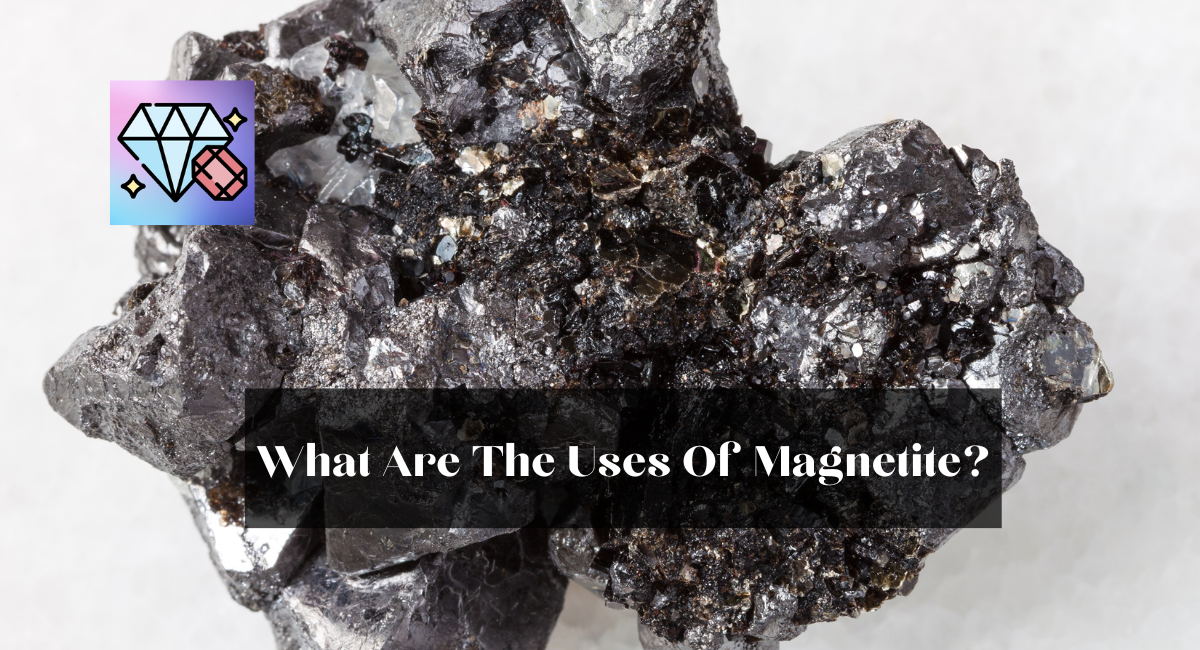Magnetite, an extraordinary mineral whose name alludes to its magnetic properties, has fascinated humans for centuries. It plays a pivotal role in both the natural world and our daily existence, owing to its unique properties and wide range of applications.
This iron oxide mineral is magnetically attractive and a valuable resource in various industries, with applications ranging from the practical to the scientific. This article will explain what are the uses of magnetite.
What Are The Uses Of Magnetite?
1. Iron Ore
Magnetite is an essential source of iron and is regarded as one of the most vital iron ores. Magnetite can yield a high iron content when processed, making it a valuable raw material for producing iron and steel.
It is a primary source of iron for the steel industry due to its high purity and iron content.
2. Magnetic Material
Magnetite’s strong natural magnetism is one of its most distinguishing characteristics. This magnetic property makes it indispensable in producing various materials and products.
magnetite is employed to produce permanent magnets, which are necessary in a vast array of applications, including electric motors, generators, loudspeakers, and more.
3. Heavy Media Separation
Magnetite plays a crucial role in industries such as coal mining and mineral processing involving heavy media separation.
Density differences are utilized to separate valuable minerals from waste rock. Necessary for the efficient extraction of valuable minerals.
4. Paint And Pigments
Magnetite is an essential source of black and brown pigments used in paints, inks, and dyes because of its black color.
It contributes to the production of dark and robust colors in a variety of creative and industrial applications.
5. Water Filtration
Magnetite is utilized in water filtration processes, particularly in removing contaminants such as arsenic from drinking water.
In these applications, it serves as a filter medium, effectively trapping impurities and helping to ensure clean, safe drinking water.
6. Ferrofluids
Ferrofluids are colloidal liquids that magnetize strongly when exposed to a magnetic field. Magnetite nanoparticles are employed in ferrofluid production.
These special fluids have applications in numerous industries, including seals in rotating machinery, heat transfer systems, and a method for regulating liquid movement in microfluidic devices.
7. Abrasives
Magnetite is occasionally used as an abrasive in various applications, such as sandblasting.
Its durability and abrasiveness make it appropriate for removing surface coatings or rust from a variety of substrates.
8. Concrete And Construction
Magnetite can be added to concrete mixtures to increase their density during construction.
This high-density concrete is particularly advantageous when radiation shielding or protection from high-velocity projectiles is required.
9. Geological Uses
Magnetite plays an indispensable role in the field of geology. Its magnetic properties are utilized by geologists to study and identify rocks and minerals.
Magnetite is commonly employed in compasses, magnetic surveys, and geological mapping to understand the earth’s magnetic field and the properties of diverse geological formations.
10. Ground Stabilization
To stabilize the land and prevent erosion. It is occasionally employed in geotechnical and construction applications to enhance the ground’s integrity and maintain stability.
11. Catalysis
It can function as a catalyst in specific chemical reactions. It has the ability to affect the rate and efficiency of chemical reactions, making it valuable in the field of catalysis.
12. Magnetite Nanoparticles
Numerous Applications in the Emerging Field of Nanotechnology.
These nanoparticles are employed in drug delivery systems, diagnostics, and as contrast agents in medical imaging, specifically magnetic resonance imaging (MRI).
What Is Magnetite Called Now?
Magnetite is still commonly called “magnetite.” its name remains the same as it is a well-known mineral with unique propertie
It is well-known for its natural magnetism, high iron content, and numerous industrial applications, including iron and steel production, magnetic materials, and as a geological and scientific references.
What Are 3 Facts About Magnetite?
- Magnetite, a naturally magnetic mineral, is one of the most abundant sources of iron, containing up to 72.4% iron.
- It is essential to produce magnets and magnetic materials used in various applications, from electric motors to MRI machines.
- It is used to study the Earth’s magnetic properties and is frequently used as a reference mineral for magnetic measurements and compass calibration in geology.
Magnetite represents the versatility of natural materials, from its role in compass needles guiding explorers across uncharted territories to its modern applications in environmental cleanup and medical diagnostics. This extraordinary mineral remains integral to our technological advancements and geological understanding of the earth’s past.
Read More: Things To Make With Grandma’s Old Jewelry

